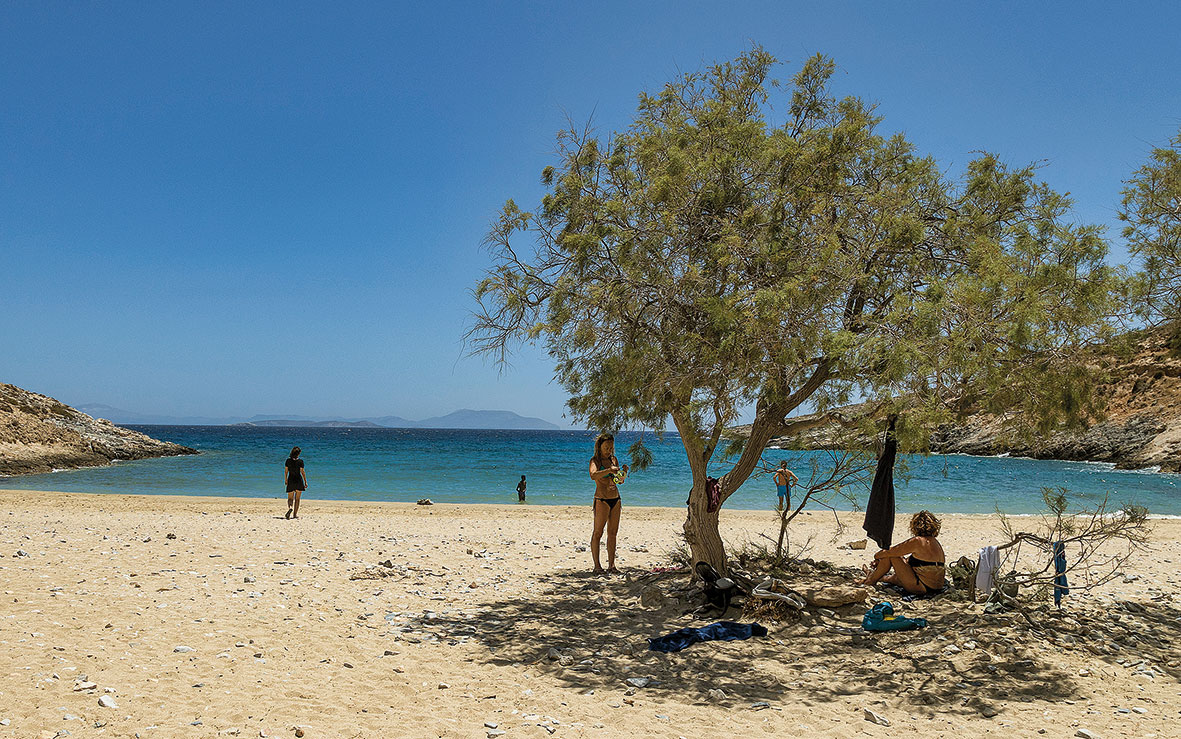Ano Koufonisi, Schinoussa, Iraklia. Three “siblings” with different personalities, sharing the same waters of the Aegean, nestled between Amorgos and Naxos.
The biggest (in popularity, not size) is Koufonisi; as all first-borns it attracts the most attention, and probably rightly so as it encapsulates the essence of Cycladic heaven. Second in line is Schinoussa, the calm strength with deeply earthy energy, the kind that draws you to the ground and keeps you there. Iraklia is the youngest, the easier and more accessible island – visitors are dazzled by its ability to make you feel totally carefree.
We visited this special island family in the Small Cyclades (or Lesser Cyclades) for six days, two days on each island, however, as visitors will come to know, longer stays are preferable. You need time to get into the spirit of these islands. Their strength lies not in the element of surprise, or the how sights there is to see, but rather in routine.
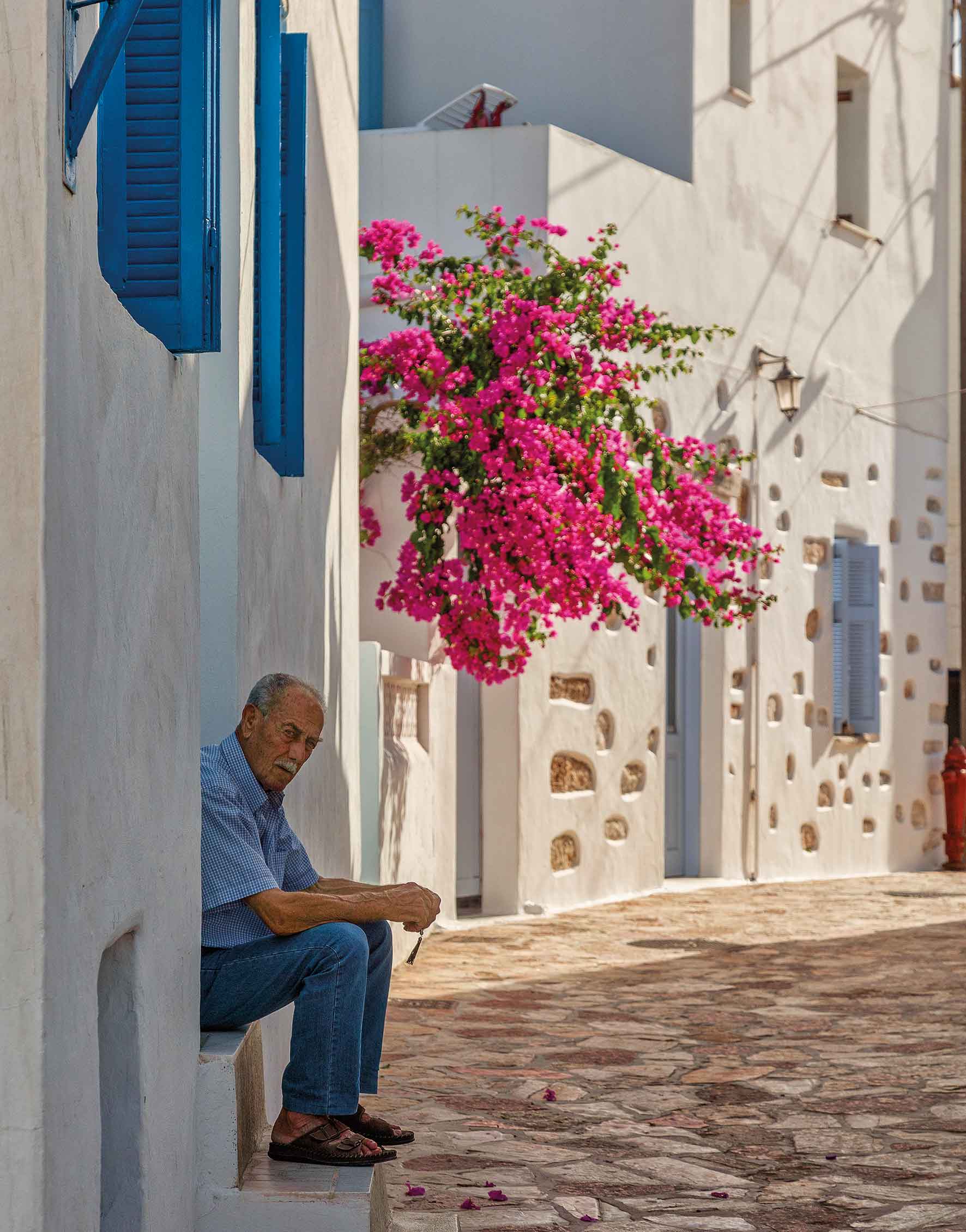
© Perikles Merakos
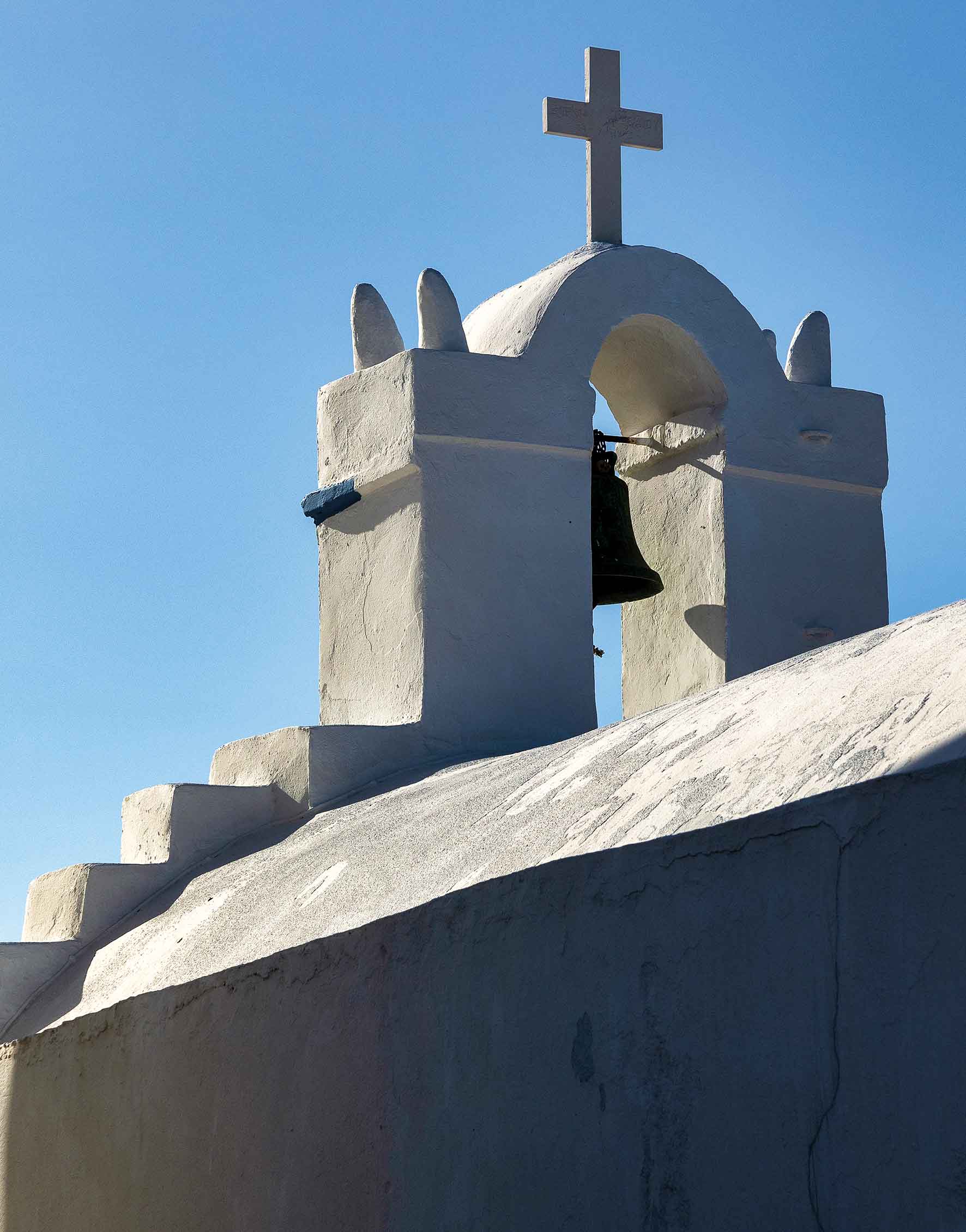
© Perikles Merakos
So what do newcomers do as soon as they arrive at the port of one of these islands? Check out the basic hangouts, find the one that suits them best and keep on going nonstop: for breakfast, for lunch, for tsipouro. Have conversations with the waiters, listen to their stories and tell their own. The day they walk into their chosen hangout, and the tall young man carrying the serving tray is no longer “the guy” but “Kostas, a mathematician who has a blond son that goes to preschool,” then that is the day they will have finally become part of the island community. They will no longer be strangers. This is where the essence of these islands is found: in the connection with the local population, which knows how to assimilate visitors and make them their own.
Here is a brief guide to some of the sites that make the Koufonisi-Schinoussa-Iraklia island complex stand out (the rest will be shared with you by your own “Kostas” at the hangout you set your heart on).
Ano Koufonisi
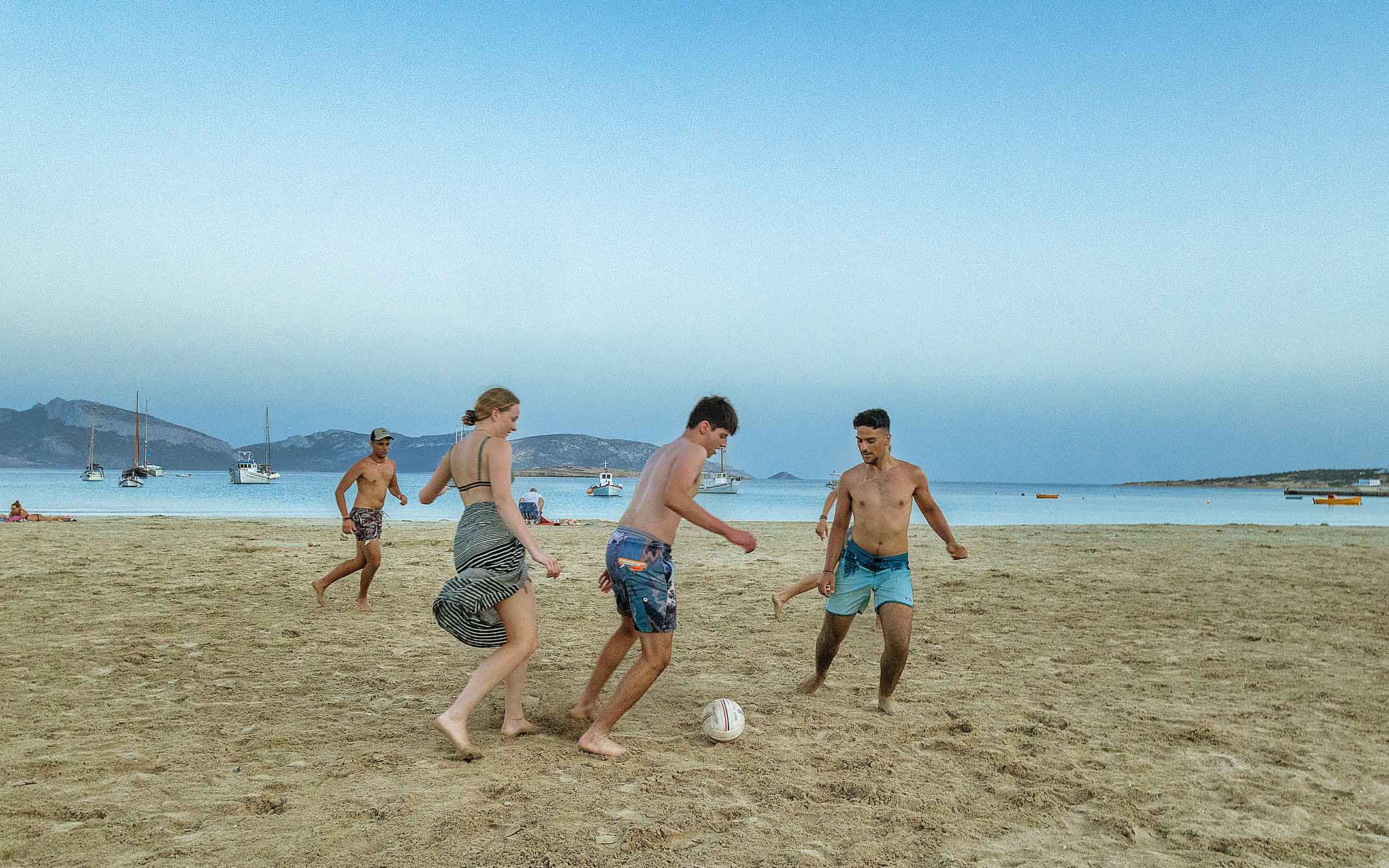
© Perikles Merakos
Something old, something new
“Finikas” (aka Dimitris Mavros) – a prime example of a local who has left his mark on the island, as he is remembered by people who visited Koufonisi as teenagers twenty years ago, and who now visit the island with their own children. With his smile shining through his thick island mustache, “Finikas” is the cornerstone of the homonymous restaurant on Harokopou beach, boasting a shaded terrace, wooden tables and a very warm atmosphere. Mask-wearing waiters with lively intense eyes rush around in the heat taking orders. Enjoy the ice-cold beer and serving of amazing baby goat placed on the table as you gaze at Koufonisi’s turquoise blue waters, with Keros in the distance. There really is no better place to start off your stay on the island than Finikas restaurant.
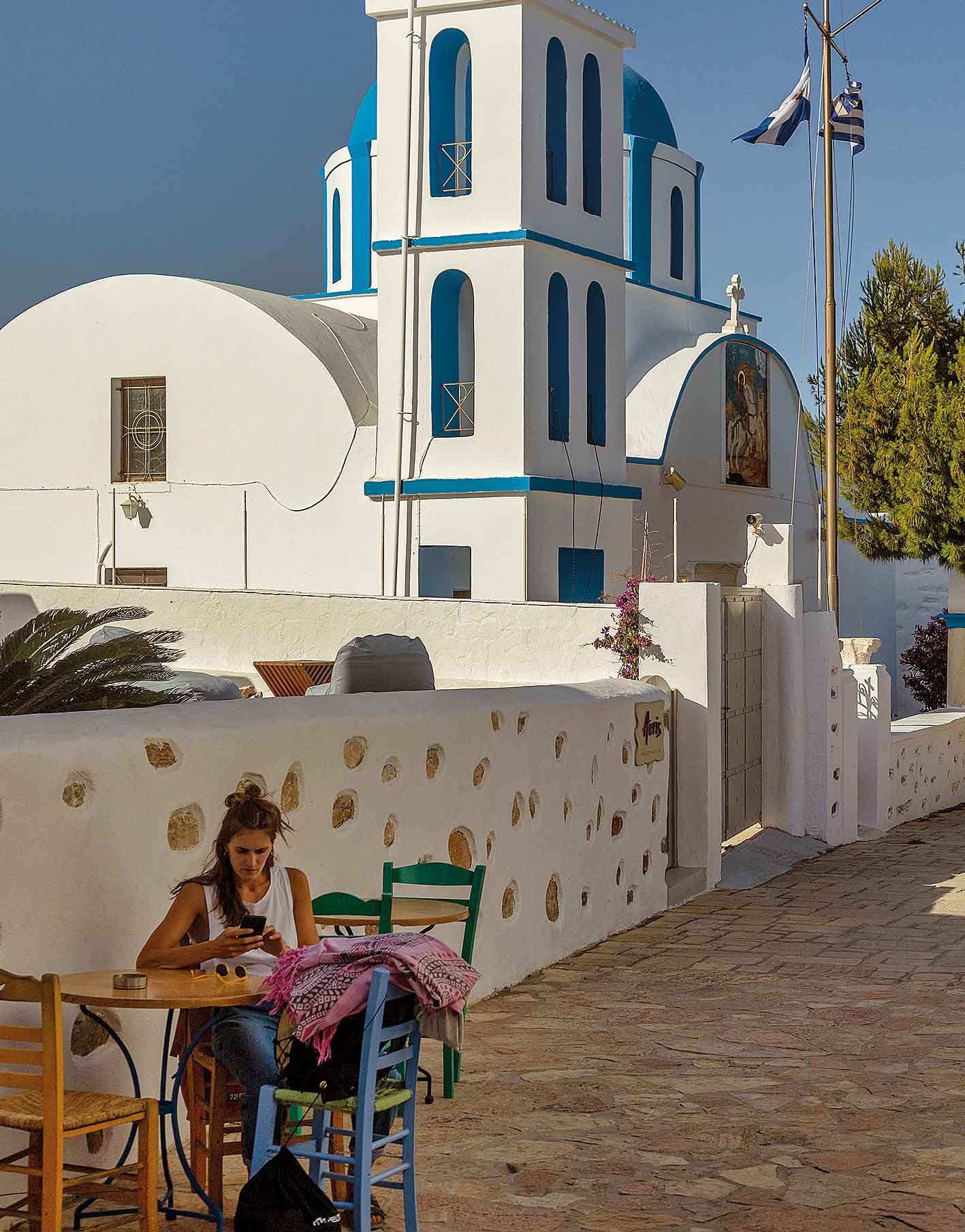
© Perikles Merakos
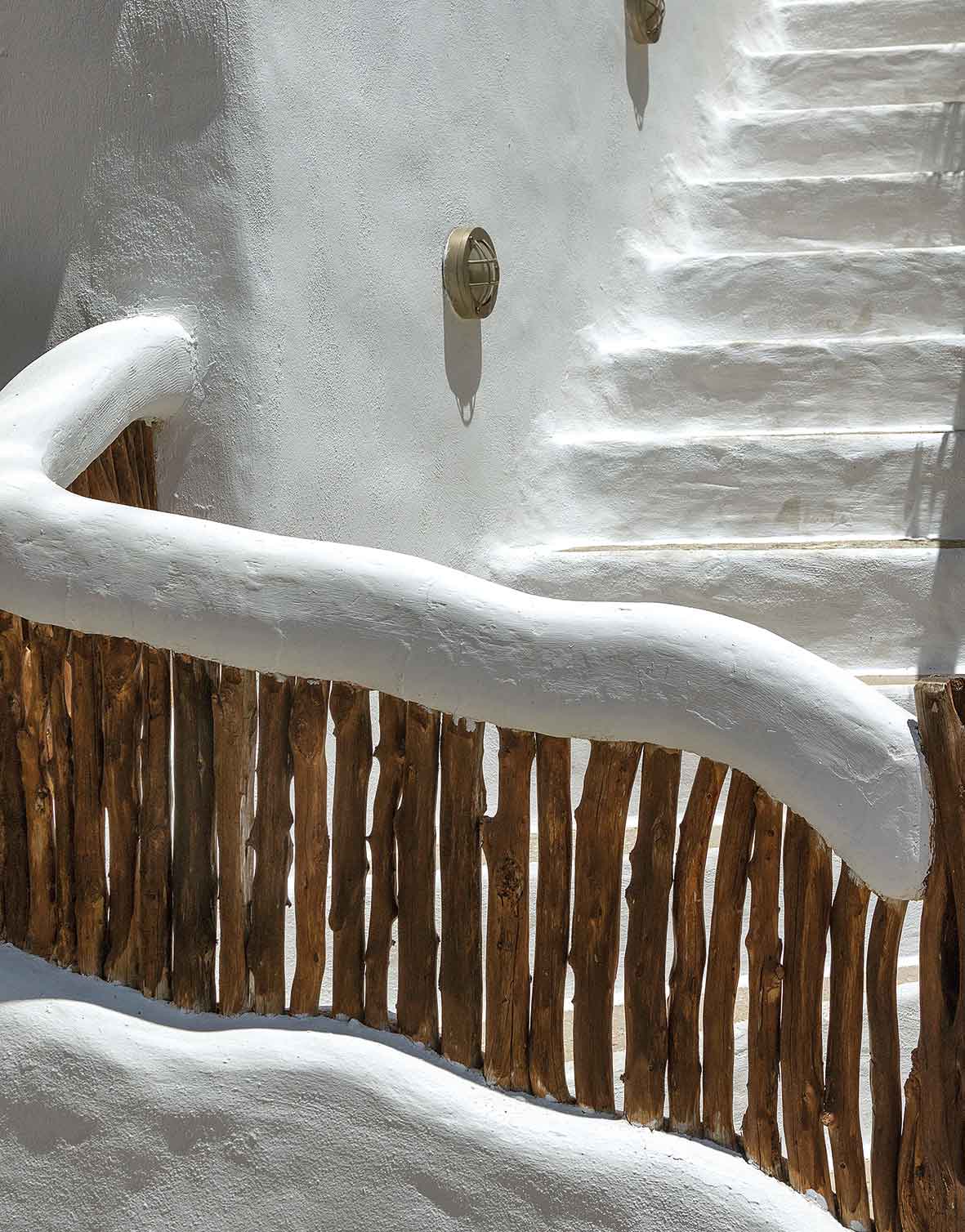
© Perikles Merakos
Another old hangout that has made history is Nikitouri, a seafood taverna. Last July it reopened its doors under a new identity – λάSkα restaurant. Chef Sifis Manouselis designed the menu that features Greek cuisine inspired by Asian traditions. Creations include the Cycladic bowl with fish tartare plus sweet and sour sauce with tomatoes, calamari risotto with Greek herbs, sour butter and seaweed powder, desserts with cream of Greek coffee, rose and kaimaki.
The staff is friendly, the view gorgeous, and the style modern and renovated – in essence, it encapsulates the present identity of Koufonisi; no longer an alternative destination in the Cyclades, always a good-quality but definitely more mainstream island.
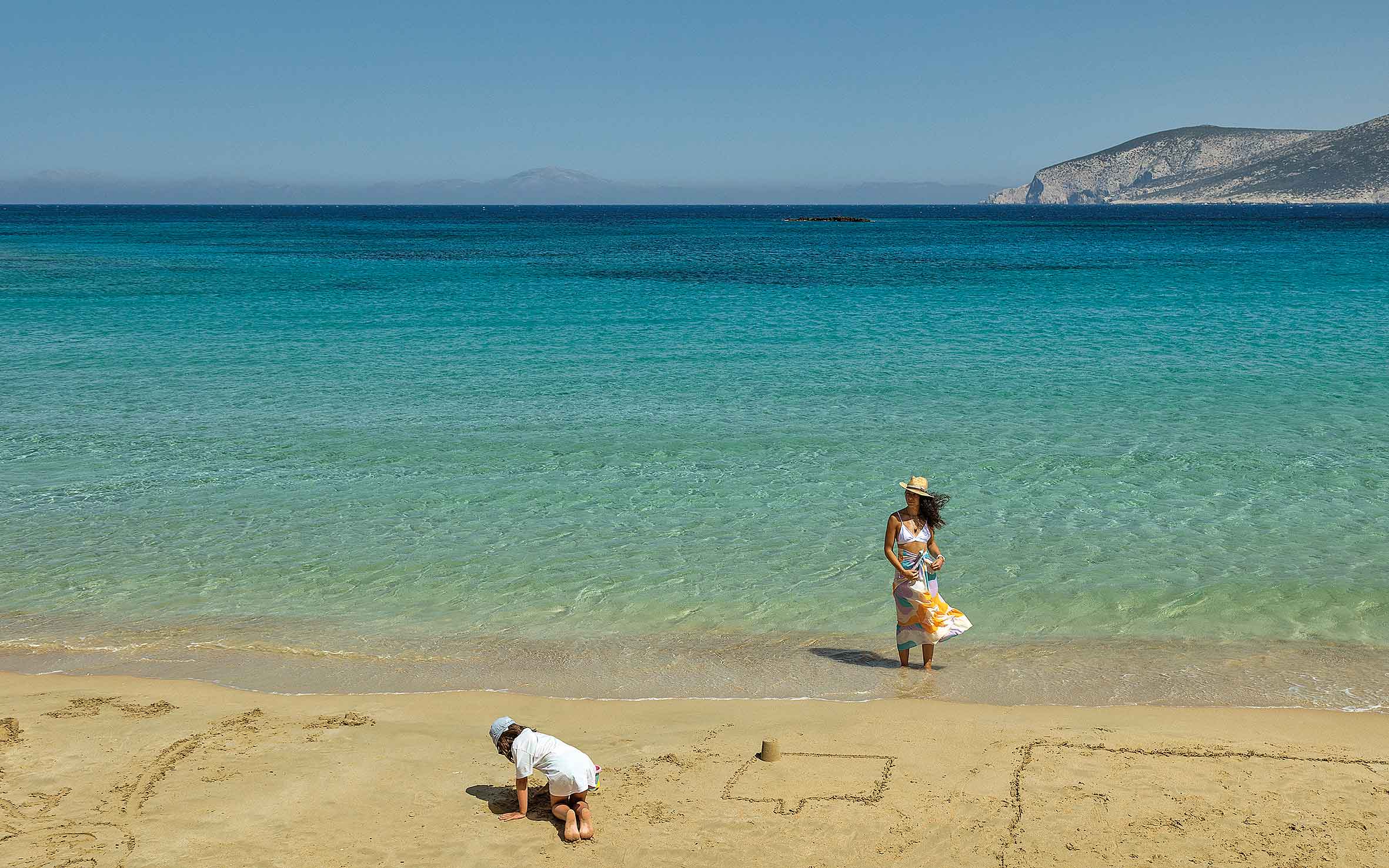
© Perikles Merakos
Koufonisi today is composed of new restaurants, new boutiques, new hotels and many new faces (of course, together with the island’s fanatic visitors), who are in search of the refined luxury of a small island. The good news is that even though Koufonisi experienced an abrupt change, it has not fallen out with its original self. It remains – at least until the end of June when we visited – a paradisiacal land with one main settlement (Horio), honey-colored rocks, golden sand, sparkling turquoise waters and amazing beaches (Ammos, Fanos, Platia Pounda or Italida and of course Pori are some of the more well-known ones).
Some may even include coastal hangouts but without imposing the regular culture of a beach bar as there is no loud music and/or crazy partying. Koufonisi preserves its tranquility and well-kempt image. There are also outdoor “polling stations” inviting visitors to “vote with their cigarette” – they basically dispose of their cigarette in one of the two containers in reply to the question: “Did you know that cigarette butts contain plastic and have a lifespan greater than ten years”? Both containers – the “no” and “now you know!” are half full, indicating that visitors are heeding the call to keep the island clean.
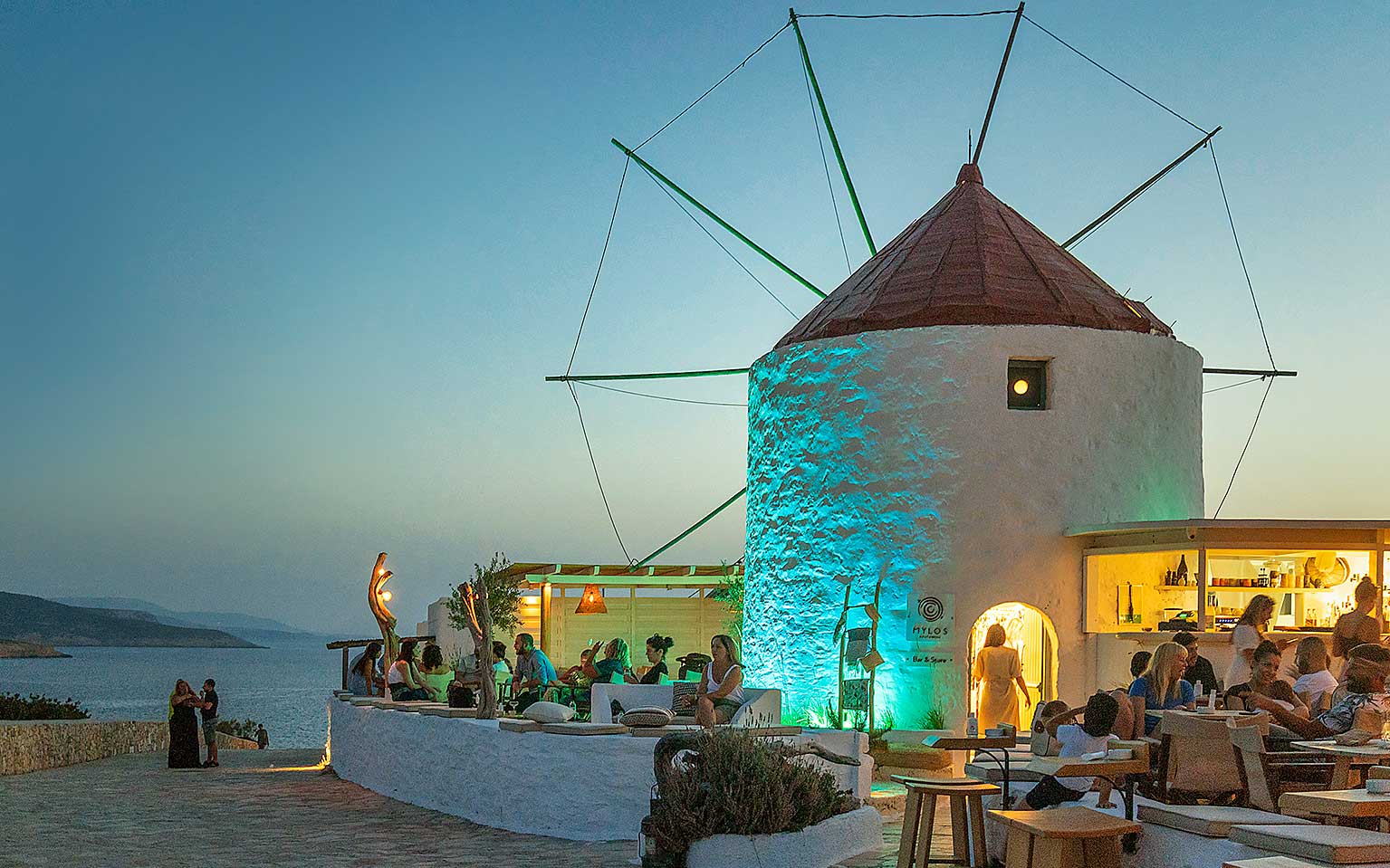
© Perikles Merakos
This new phase on Koufonisi also includes two more spots that are worth visiting. The first is Mylos, a former windmill from the early 19th century (also known as “Xetroharis” or “All Weather”) that has been converted into a “cultural concept store,” as per its owners. In addition to getting an in-depth tour of the anatomy and history of the structure, you will also find a special selection of garments and cosmetics by Greek designers and producers.
The second is Koufonisi Villas, a hospitality complex designed by architect Maria Papadaki. In addition to staying in the villas, there are also different types of seminars, retreats and treatments on offer, such as yoga retreats, capoeira, sound therapy, massages, acupuncture, etc. Here, in the shaded complex shala, among the juniper and pistacia plants, with the statue of a Buddha placed under an olive tree, one can see a microcosm of the new Koufonisi – an island that wants to preserve elements of its old self (calm landscape, untouched nature, tranquility) while also discovering a new aspect that is more outgoing and ambitious, as Cycladic as it is cosmopolitan.
Schinoussa
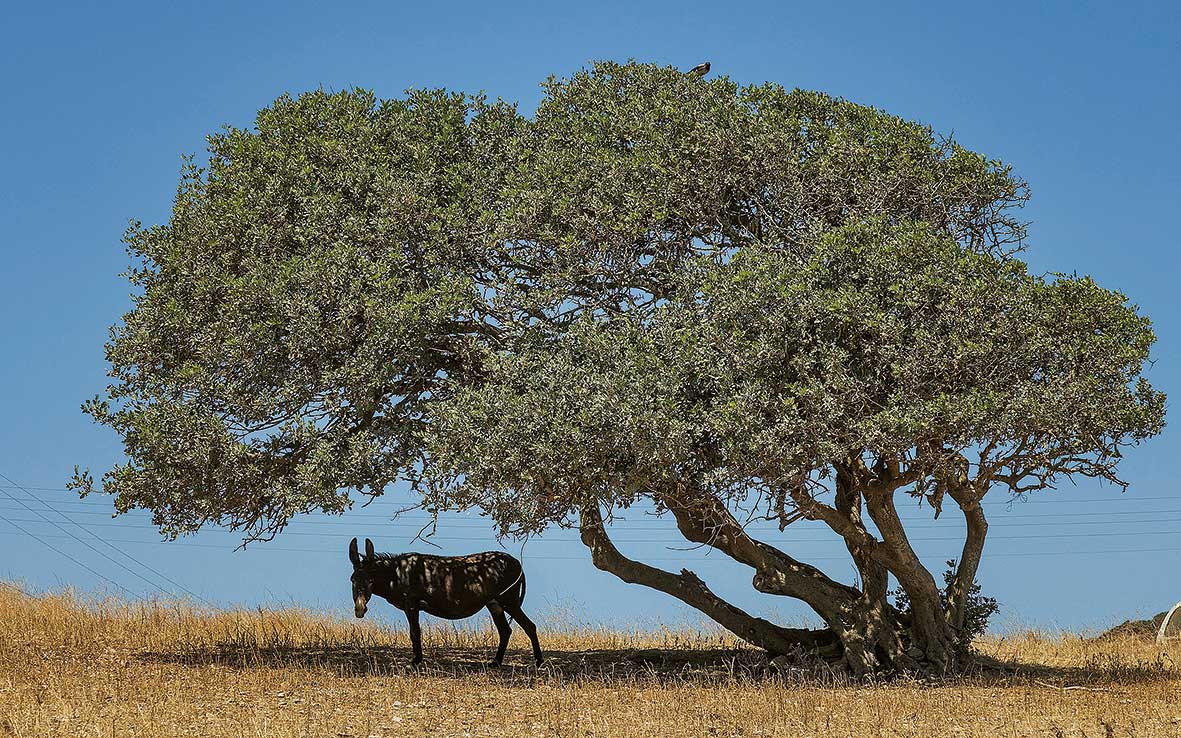
© Perikles Merakos
Fava and dirt
From Koufonisi, which is almost at the height of its rise and constantly trying to reinvent itself, to Schinoussa, a more grounded island that is also undergoing changes but at a slower pace, much more silently. There are also new hotels and people who want to invest here, but it is something you need to search for.
As a simple tourist, what you see is a small and beautiful Cycladic island with two main settlements – Hora and Messaria – calm waters (well-known to private boats), churches with unusual names (such as Panagia Akathi) or strange facades (such as Agios Filaretos). A land with low vegetation, stone walls, filled with animals (donkeys nursing their young, chickens, black roosters, turkeys, geese), and many dirt roads, which you feel you traverse a million times, since to go from north to south and from east to west you always pass through the center of the island.
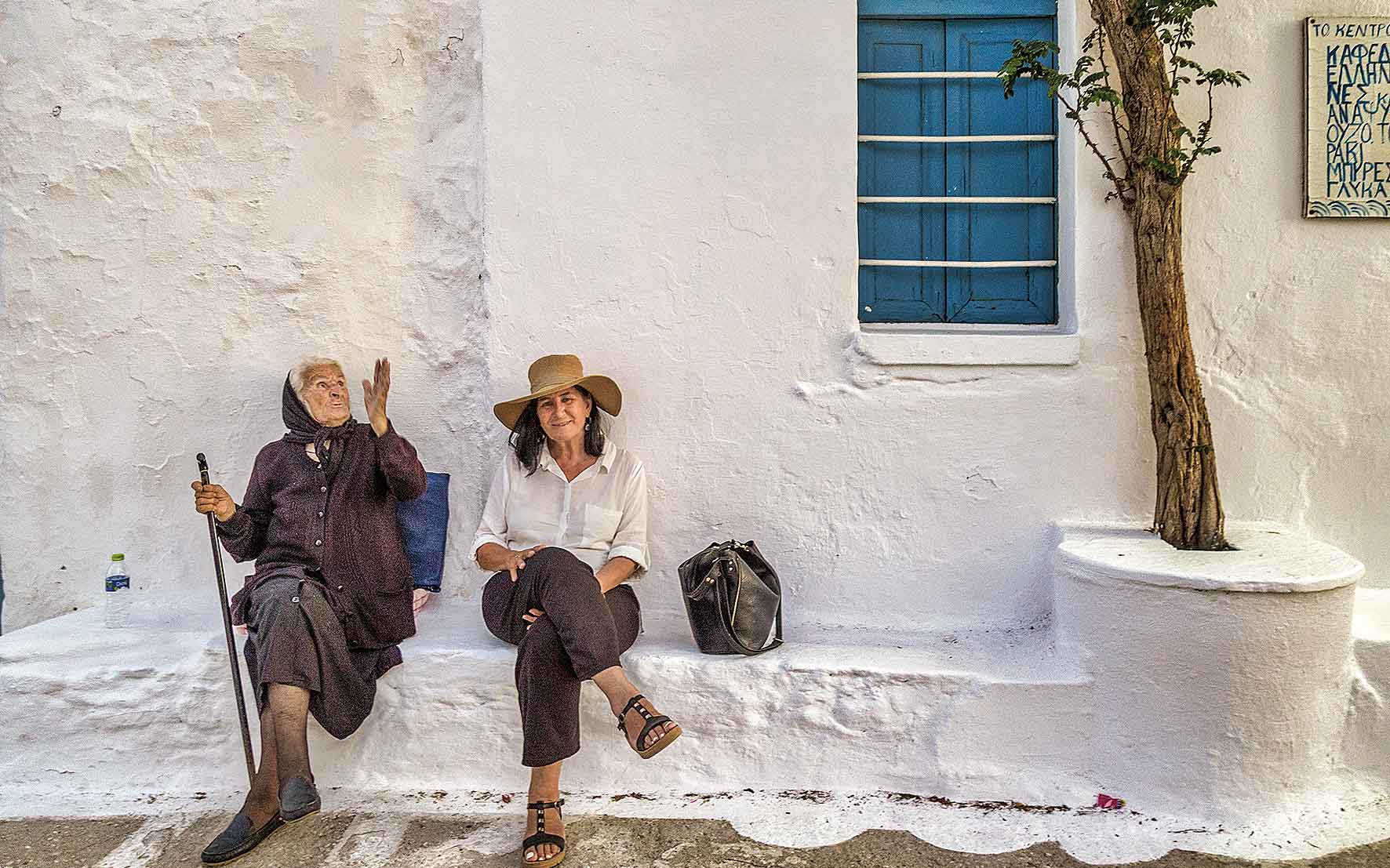
© Perikles Merakos
Regarding beaches, Schinoussa has many good ones. In Psili Ammos people gather under the five-six tamarisk trees for shade, on sandy Tsigouri with the nice beach bar the view of neighboring islands is offered gradually (first you see Plaka island, further back you see Venetiko, Iraklia and in the distance, faintly, you can glimpse at Ios). There are also other beaches, such as Aligaria, Lioliou, Almyros, and Gerolimnionas (some walking required), that are worth spending a few hours on.
Because the truth is that there are not many things to do on this island. Beach, reading, hiking – if it is not too hot – dessert, coffee and food. What food? Fava. This is a field where Schinoussa is making a difference and investing, having managed to build its own gastronomic identity. Schinoussian fava has moved beyond the island to be served in well-heeled restaurants in Athens, Crete and Thessaloniki, recognized as a unique Cycladic delicacy.
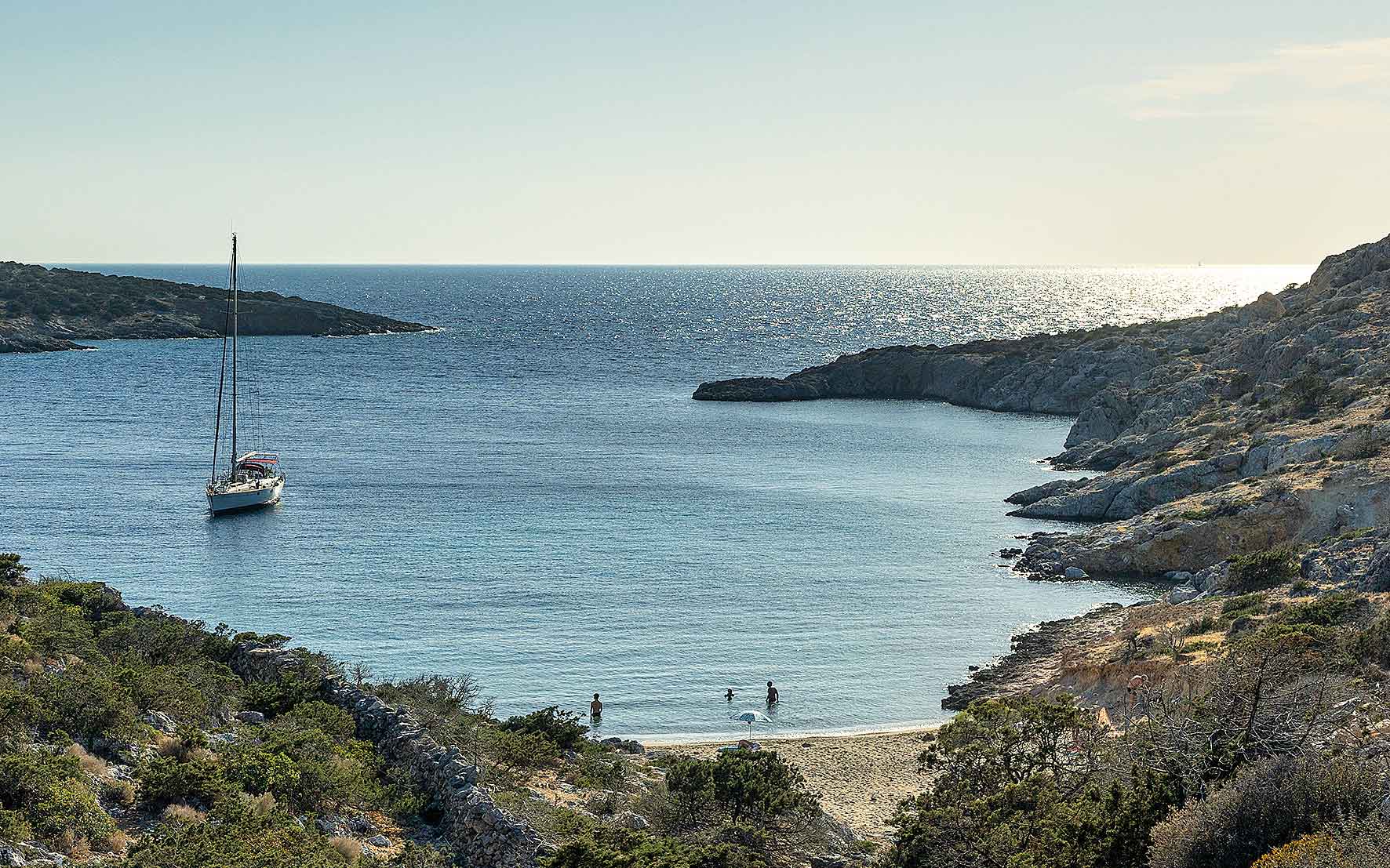
© Perikles Merakos

© Perikles Merakos
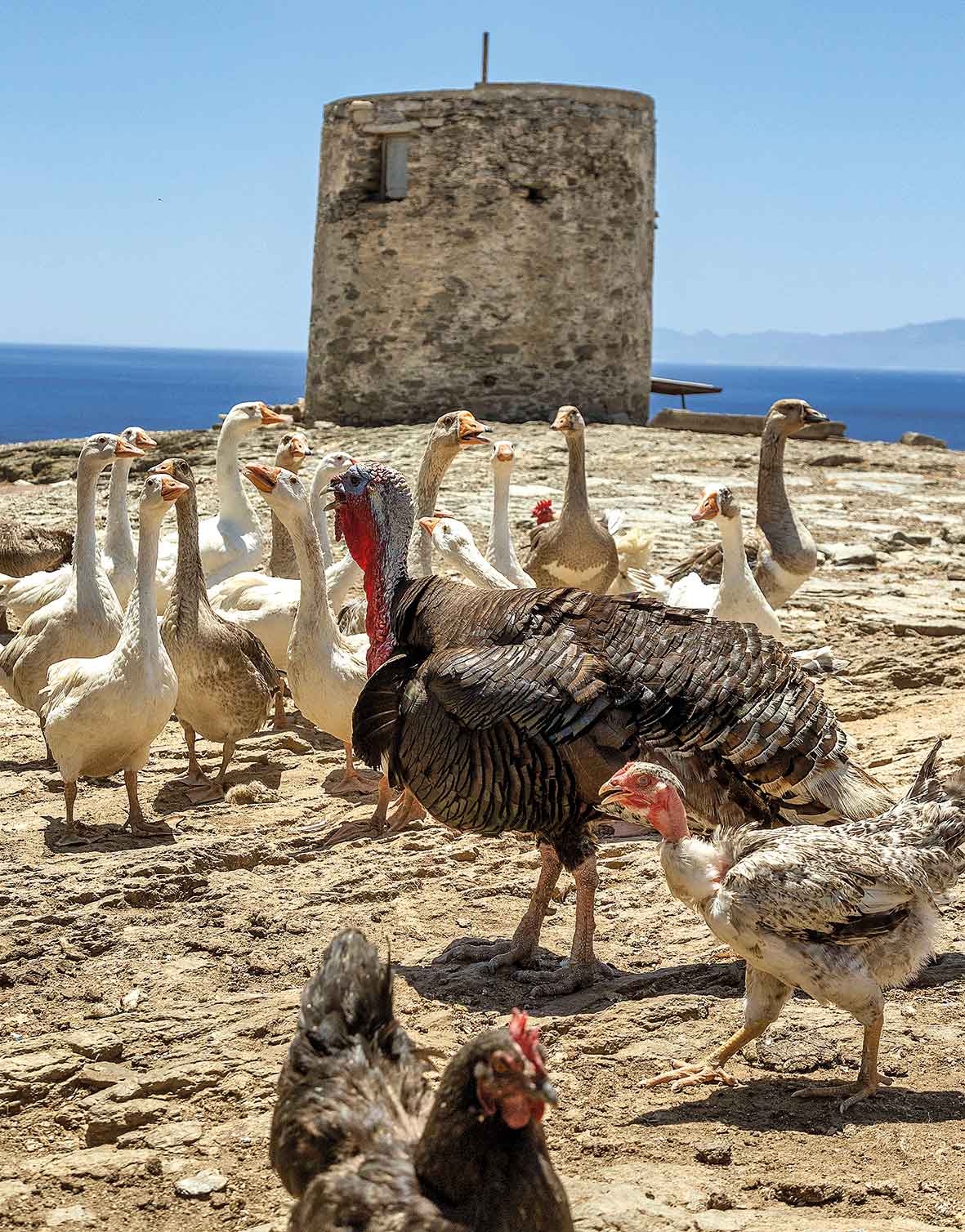
© Perikles Merakos
Of the approximately twelve fava producers on the island, few are professionally involved, with the most well-known and active being Manolis Kovaios. First off, he corrects a misconception held by many: “Fava is any legume that is cooked and pureed. It could be made from broad beans, split peas or peas.” In Schinoussa fava is made from katsouni peas, according to Manolis a seed that was brought to the island in the 9th century by farmers from Amorgos. It took to the island, was incorporated into local dietary traditions (due to its high protein content, it was used during fasting periods).
Today, Schinoussian fava travels to exhibits and fairs as yet another ambassador for tourism, enchanting foodies everywhere, giving them a good reason to visit the island and see the land that births this wonderful ingredient.
Iraklia
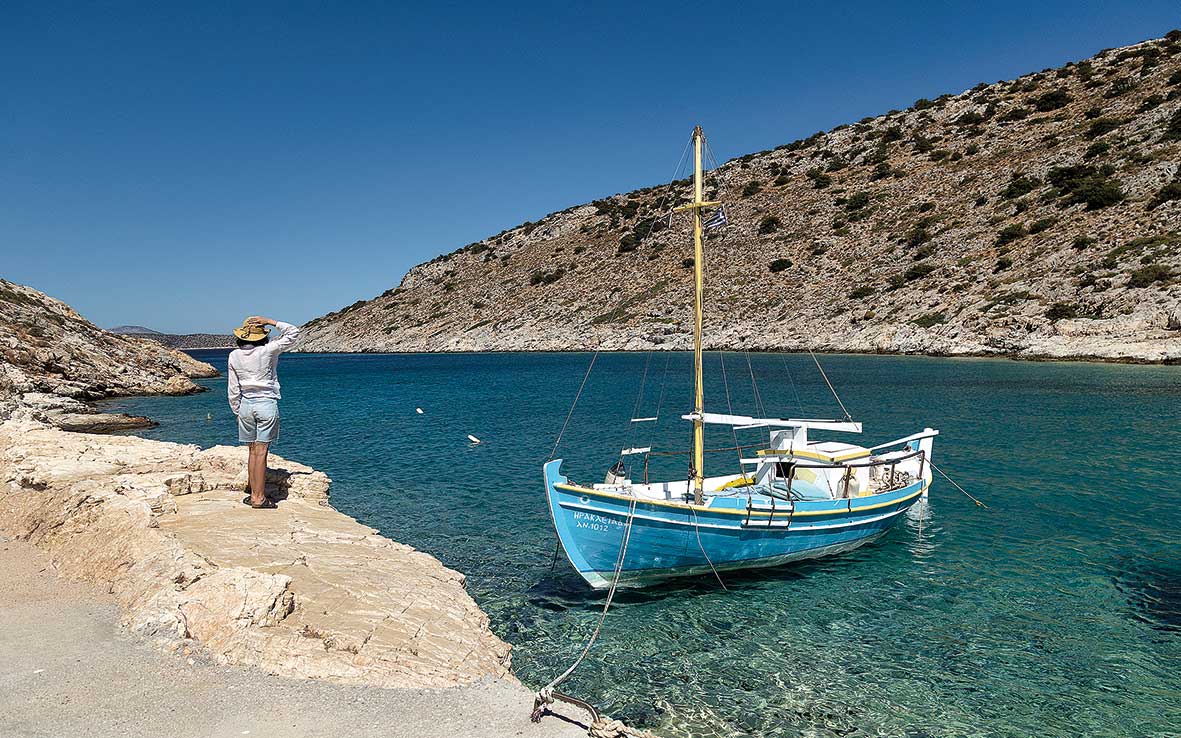
© Perikles Merakos
People and cats
We arrive at the third island, Iraklia – the last act of our mini Odyssey. Easy and accessible, it makes you feel carefree, not only because of the simple landscape – without the intense colors of Koufonisi or the strong energy of Schinoussa – but also because its people are so warm and welcoming. This is what you will remember from the island, more than anything else.
Featuring two main settlements, Agios Georgios and Panagia, an old abandoned castle and the cave of Agios Ioannis (that has unfortunately been terribly vandalized over the years), Iraklia extends its warm welcome from the port, with the beach lined with benches, and the young children playing just a few meters from where the ferry docks. In the southeastern part of the island you will find the amazing Livadi beach, further south is Tourkopigado that resembles a fjord, and further west you will find Karvounolakos and Alimia, home to the shipwreck of a German seaplane that you can explore underwater (note that most of the beaches on the southern side are accessible only by boat).
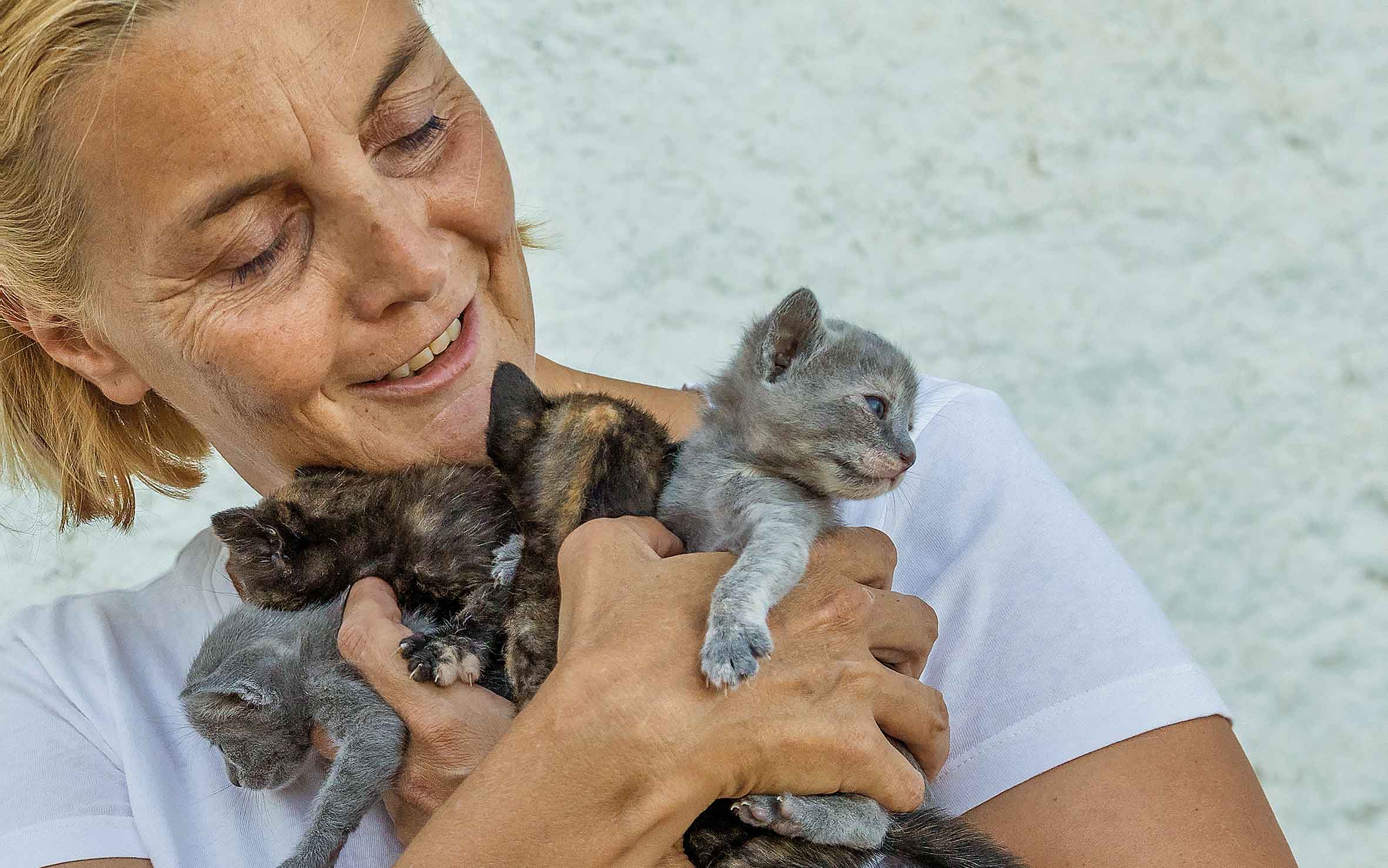
© Perikles Merakos
What else is there in Iraklia? People, many lively people, who grab you by the hand and take some time from their busy day to show you their land. Antonis Kouikl, whom you might have met only a few hours ago but is still willing to let you into his house to have a shower after a swim in the sea. Maro, Iraklian by choice, who has created an Instagram account called People of Iraklia, dedicated to the island’s inhabitants. Be sure to give her a t-shirt so that she can print the logo People of Iraklia on it so you can keep the island in your heart forever. Kia, self-proclaimed protector of the island’s stray cats, who takes care of these wild felines with the help of locals and visitors. We spent an evening in her house, in a yard bubbling with dozens of cats. When Kia rattled a bucket of cat food outside the house, they lined up, as if hypnotized, to eat all together like a large family.
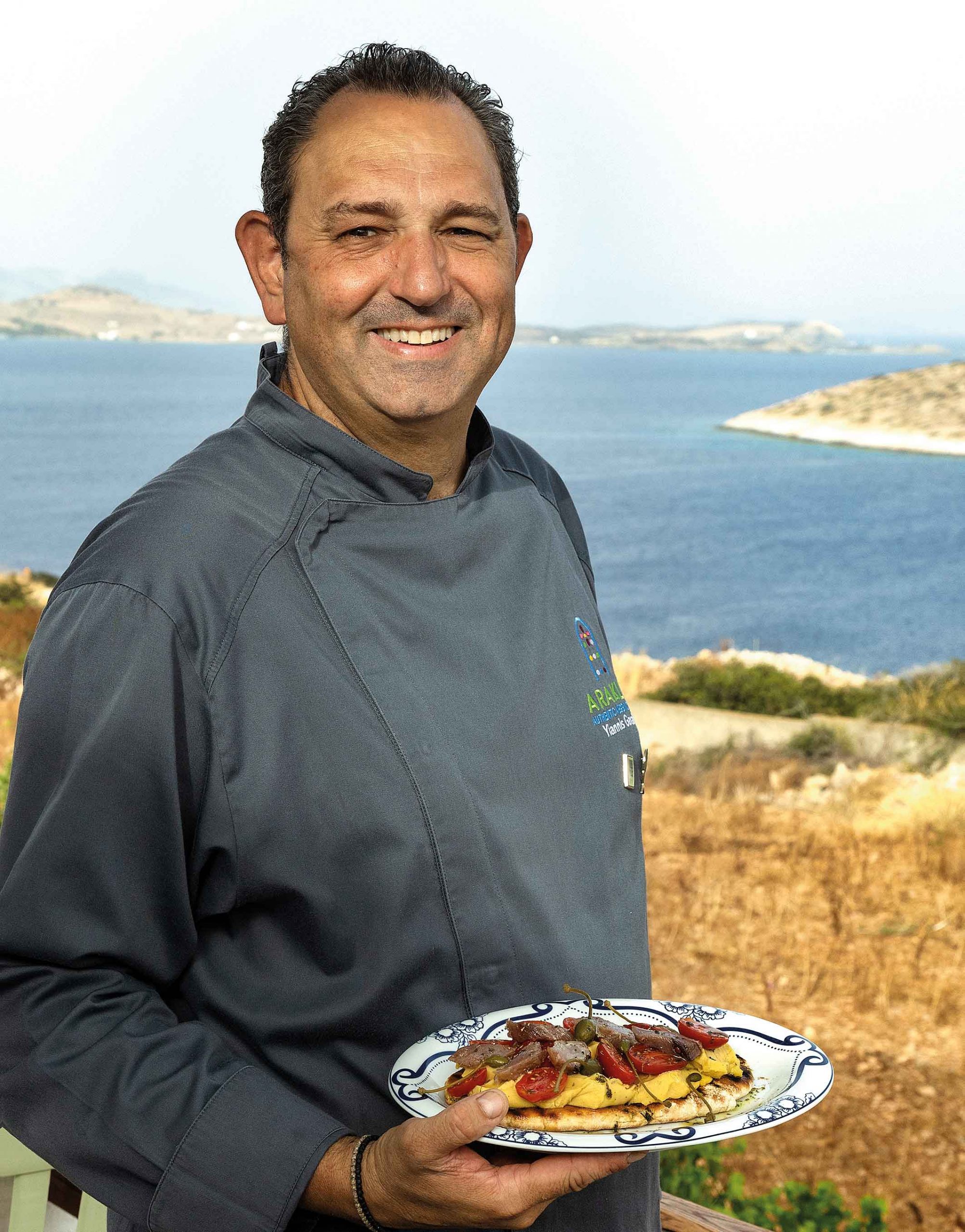
© Perikles Merakos
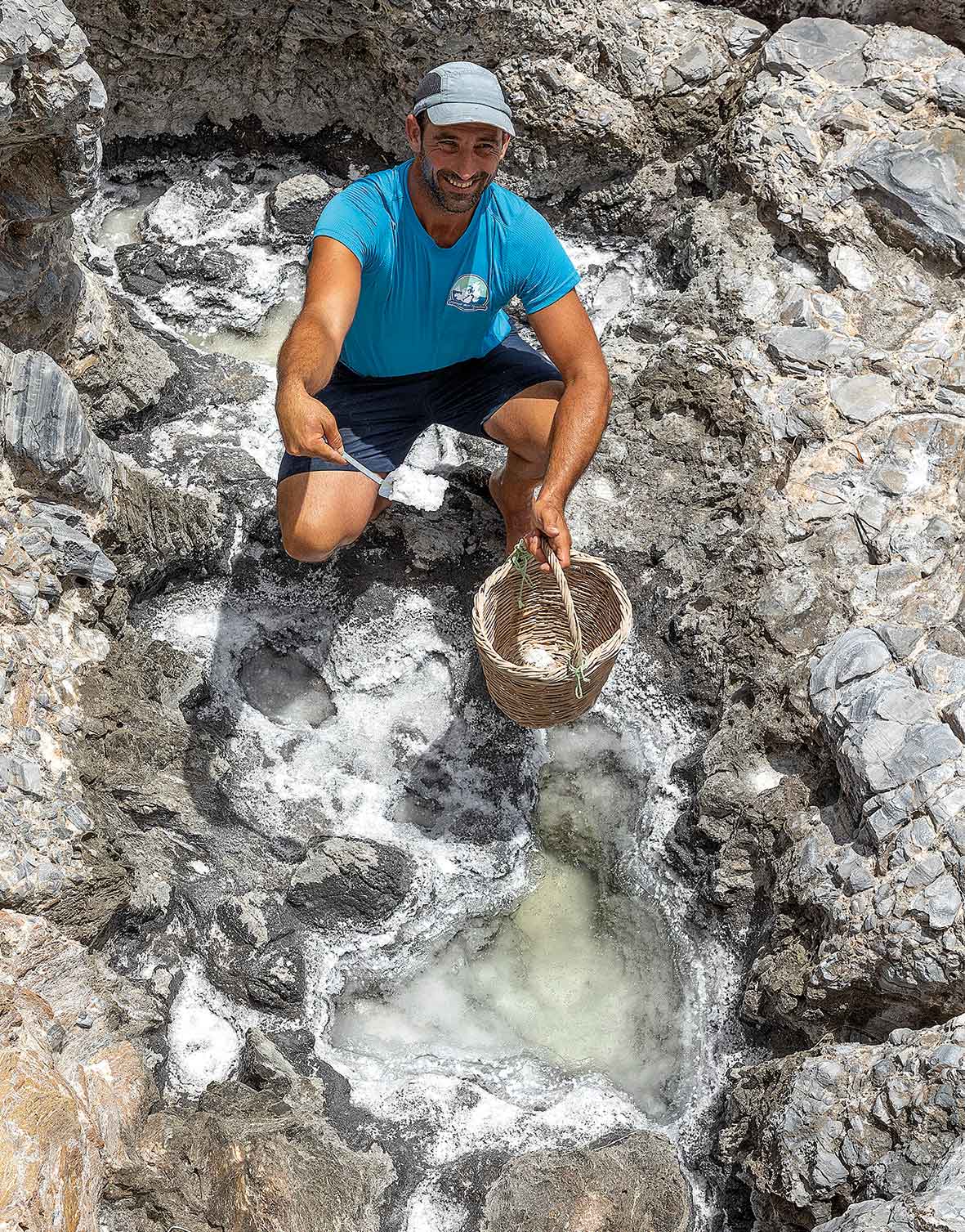
© Perikles Merakos
We were offered the best description by Dimitris Markatatos of Araklia, perhaps the most famous restaurant on the island that serves creative Cycladic dishes prepared with ingredients from the 15 islands of the Cyclades. Beyond amazing cherry tomatoes, fava, courgettes, meats and dried figs used at Araklia, Dimitris thinks that, if they had to create a dish that was representative of the island, “it would contain the locals themselves.” And he is right. If you put Antonis, Kia, Maro, Mr. Vangelis of Melissa kafeneion, Maistrali, Akathi and all the other locals, each as warm and welcoming as the other, then you would have the best summer dish of all – the unforgettable flavor of the essence of Iraklia.
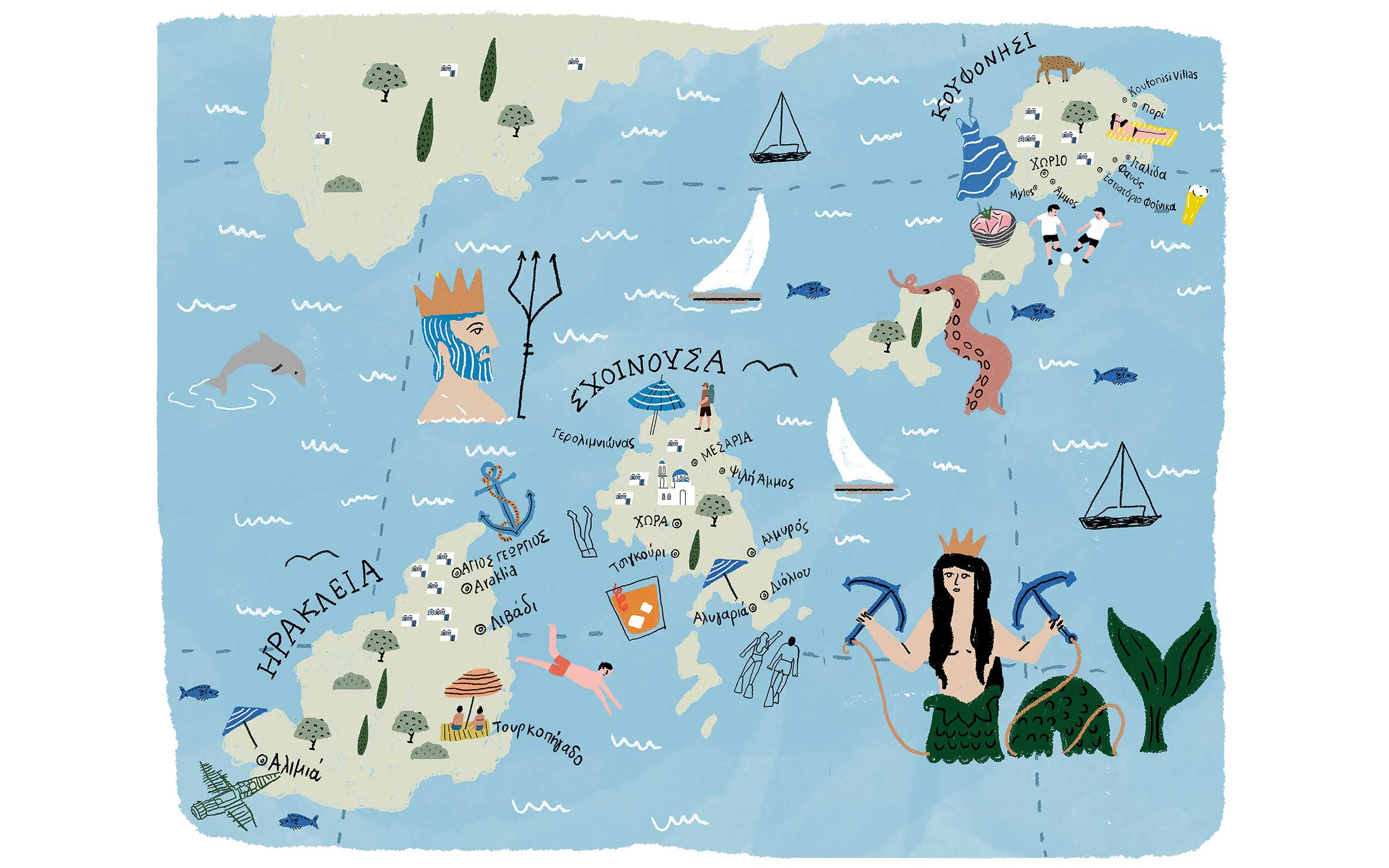
© Illustaration: Philippos Avramides
Getting there
You can reach Koufonisi by boat from Rafina with Fast Ferries (7 hours, 34 euros single, fastferries.com.gr) or from Piraeus with Blue Star Ferries (7 1/2 hours, 37 euros or 4 1/2 hours, 61 euros single, bluestarferries.com) and with Seajets (7 hours, 70 euros single, seajets.gr). The Blue Star Ferries route to Koufonisi also stops at Schinoussa (6 hours and 45 minutes, 37 euros single) and Iraklia (6 1/2 hours, 37 euros single). Routes to the Small Cyclades are also in operation from Amorgos or Naxos with “Express Skopelitis” of Small Cyclades Lines.
Accommodation
Regarding hospitality, the bar has been raised not only in Koufonisi but also in the more low-key islands of Schinoussa and Iraklia. There are many choices. For instance:
On Koufonisi, the minimal Keros Art Hotel (Τel. (+30) 22850.71961, keroshotel.gr, 160 euros double room with breakfast) and the polished Oceanides Residence (Τel. (+30) 6972.444.931, oceanideskoufonisia.gr, 250 euros double room with breakfast).
On Schinoussa, the luxury Theasis Luxury Suites (Τel. (+30) 22850.76624, theasisuites.gr, 220 euros double room with breakfast) and Africanis Suites (Τel. (+30) 211.234.3770, africanis.gr, 90 euros without breakfast) featuring rooms with African names because of the owner’s connections to South Africa.
On Iraklia, check out Alexandra Studios (Τel. (+30) 22850.71482, 70 euros double room without breakfast) and Speires Suites (Τel. (+30) 22850.77015, speires.gr, 100 euros with breakfast).
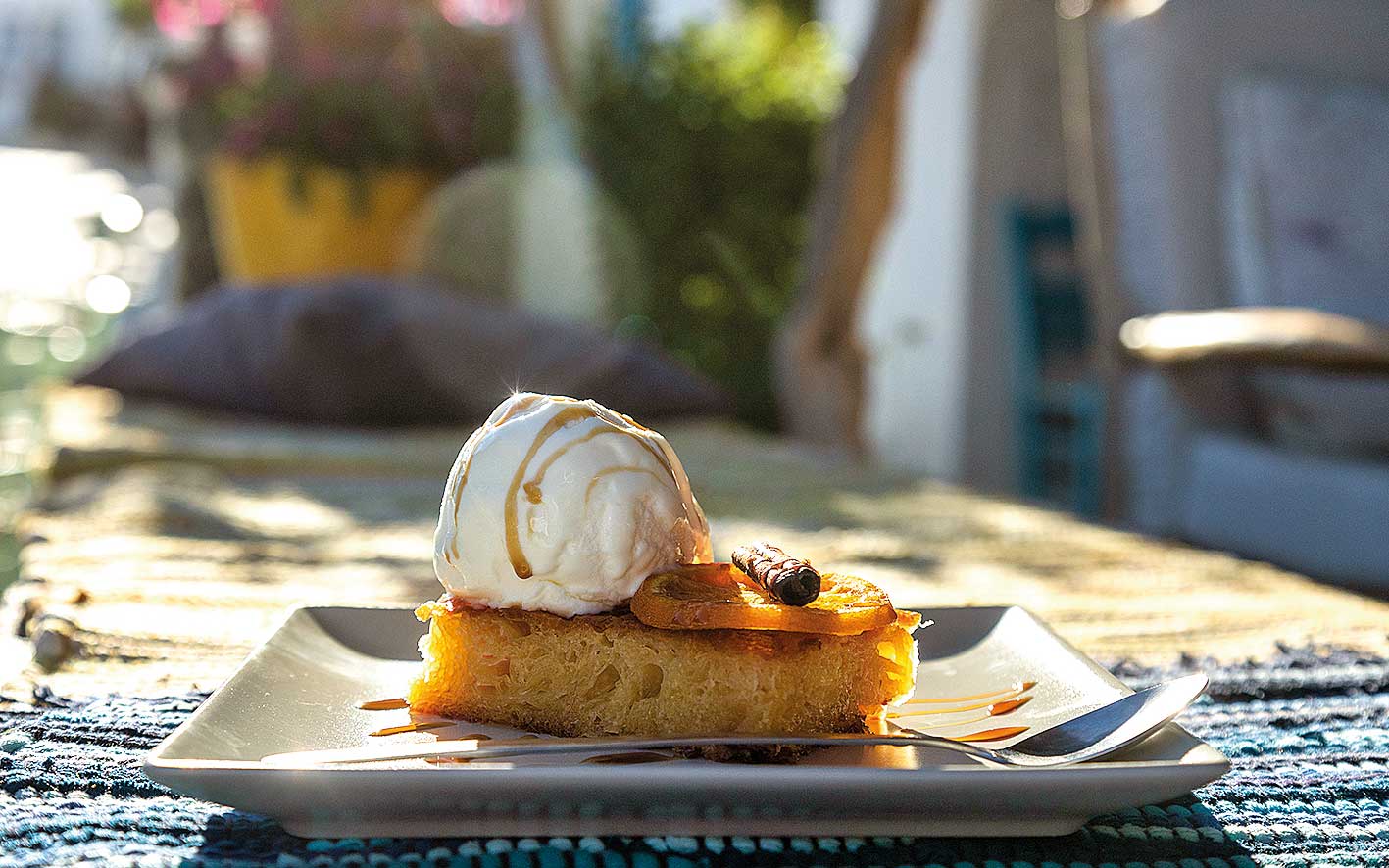
© Perikles Merakos
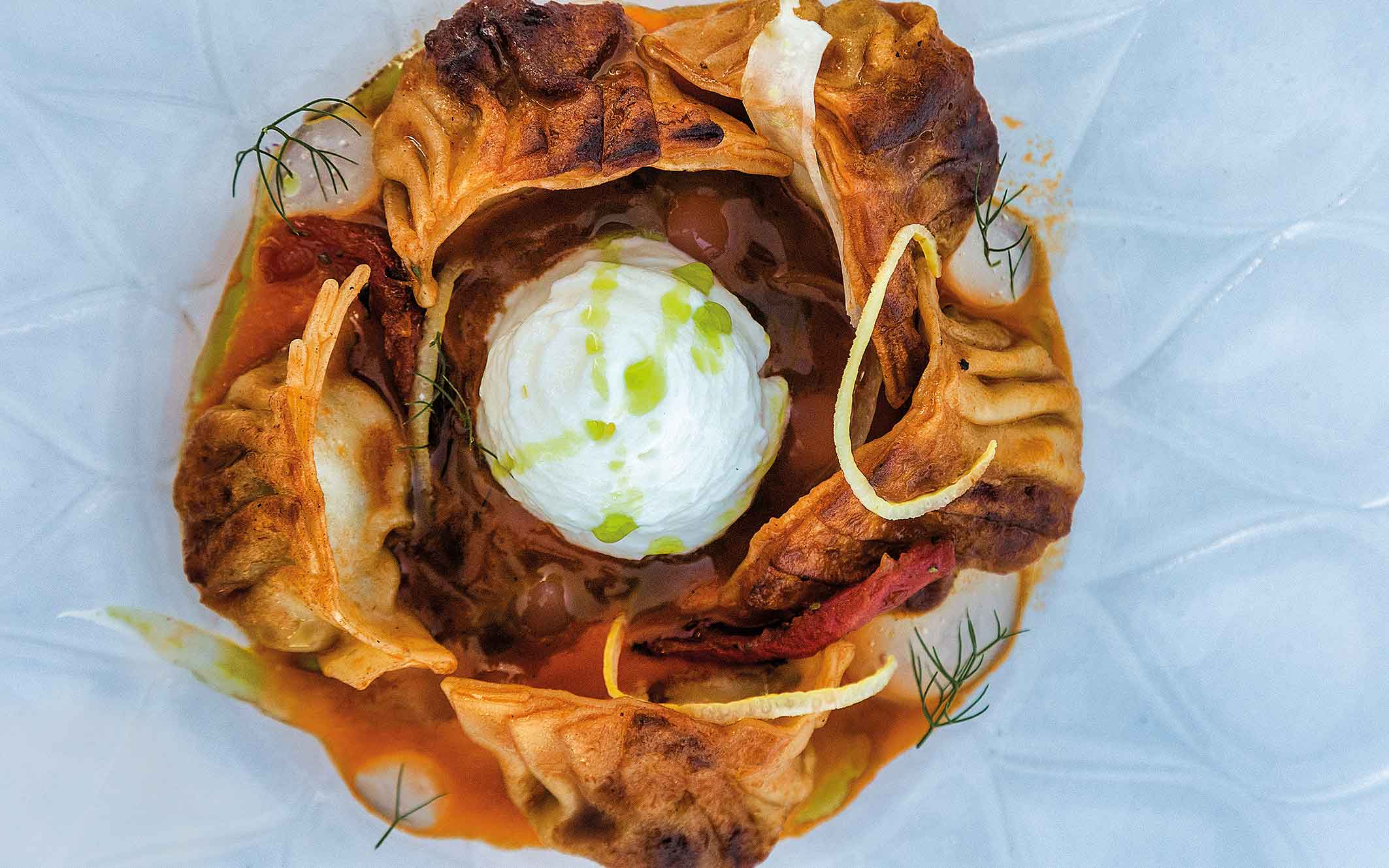
© Perikles Merakos
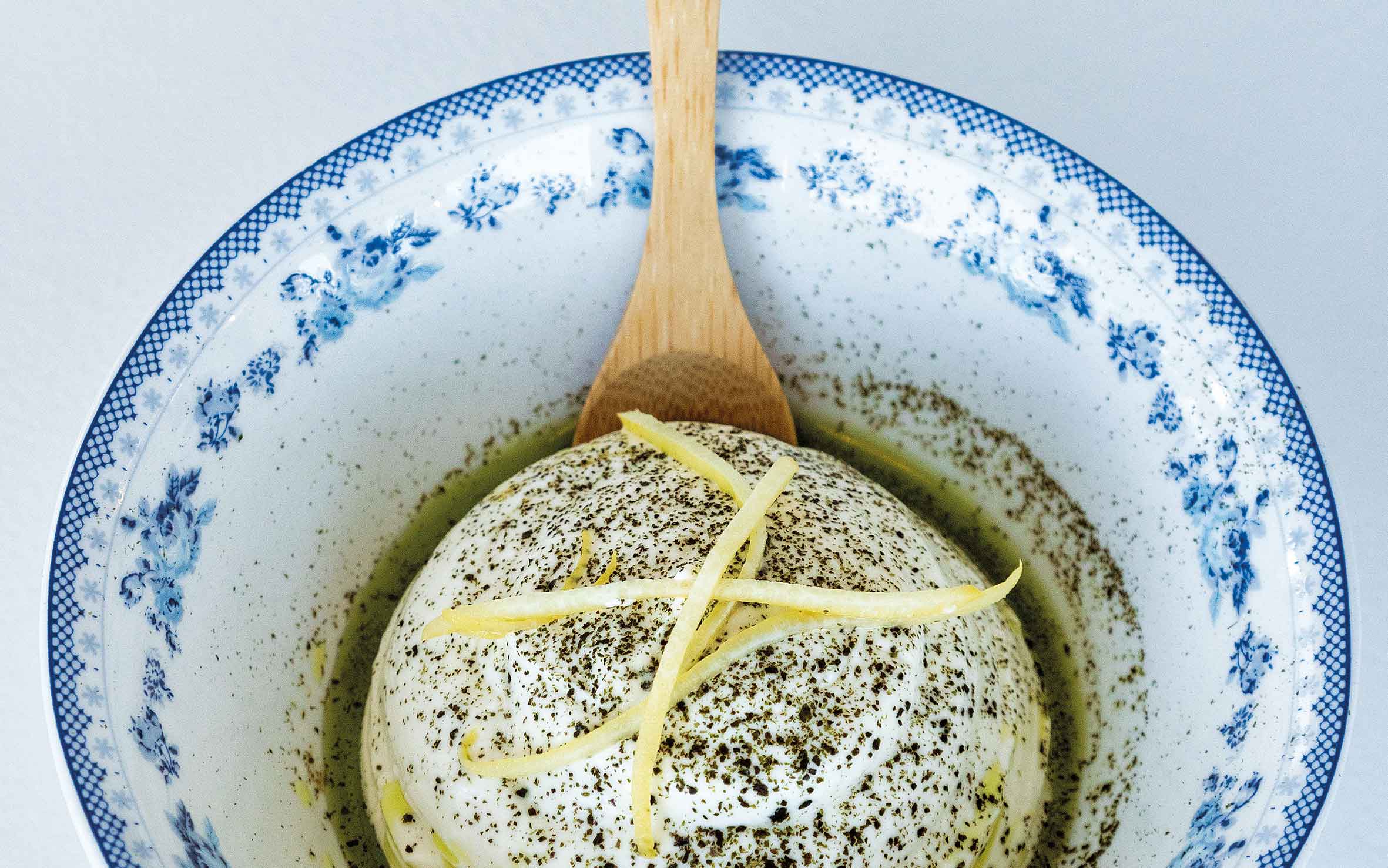
© Perikles Merakos
Dining
All three islands have very good restaurants and tavernas, classic and modern, creative and more traditional.
On Koufonisi, in addition to Finikas (Τel. (+30) 22850.74558) and λάSkα (Τel. (+30) 22850.74599), it is also worth visiting Mylos (Τel. (+30) 22850.74403) for a Cycladic breakfast of kagiana (tomato and feta egg scramble), pancakes and sausage from Mykonos, Giorgoula’s bakery (Τel. (+30) 22850.71441) for pastries, and Jet (Τel. (+30) 6984.440.000) for pasta and pizza.
On Schinoussa stop by Hara’s coffee shop (Τel. (+30) 22850.72026) for portokalopita (orange phyllo cake with syrup), check out Café tou Peri for breakfast, Bizeli (Τel. (+30) 6973.415.147), the seaside taverna Mersini (Τel. (+30) 22850.71159), Harama (Τel. (+30) 22850.76015) and Petrino for delicious lamb chops (Τel. (+30) 22850.71164).
On Iraklia, take your breakfast at Maistrali (Τel. (+30) 6974.456.662), go by Akathi (Τel. (+30) 22850.71118) for the best gemista (stuffed vegetables with rice and herbs), Araklia restaurant owned by chef Yiannis Gavalas (Τel. (+30) 22850.71570) for Cycladic dishes and To Steki tis Annios (Τel. (+30) 22850.77172) for sweets.
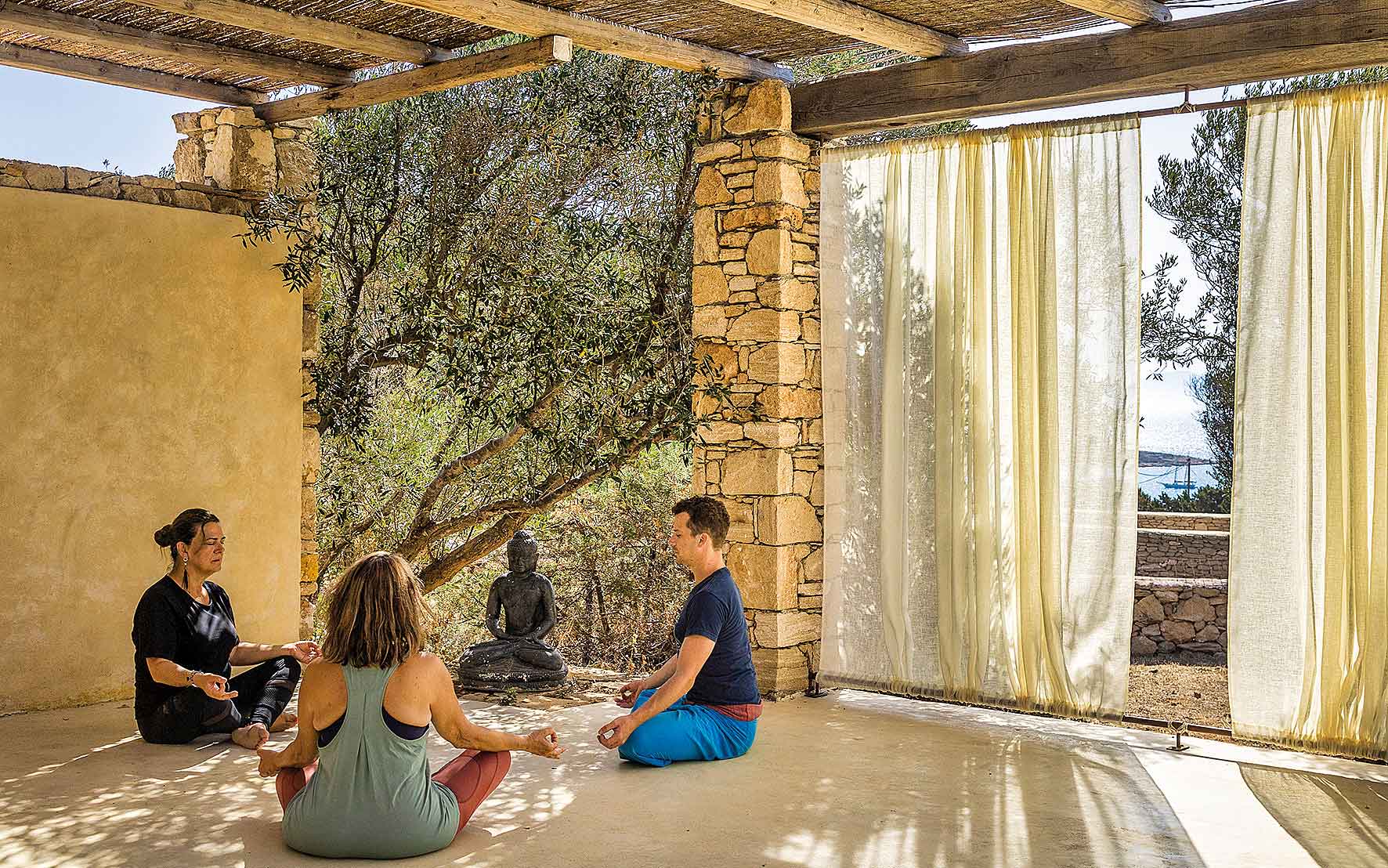
© Perikles Merakos
Transportation
The terrain of Koufonisi is rather flat and the best way to explore the island is on foot, or by bicycle. The roads on Schinoussa are rather bad, so opt for a car. A scooter is ideal for Iraklia (there is no petrol station on the island, fuel is brought over from Schinoussa).
Useful Information
For yoga retreats in Koufonisi, visit koufonisivillas.com. For information about Manolis Kovaios’ fava go to Favaschinoussas-kovaiosmanolis on Facebook. Iraklia fans must follow the accounts @peopleofiraklia and @catsofiraklia on Instagram. Cat lovers can also donate through various crowdfunding initiatives organized to ensure better living conditions for the animals. For organized activities on Iraklia, visit discover-iraklia.gr. Boat rides to the beaches can be arranged with, among others, Captain Mitsara’s boat “Anemos.”

